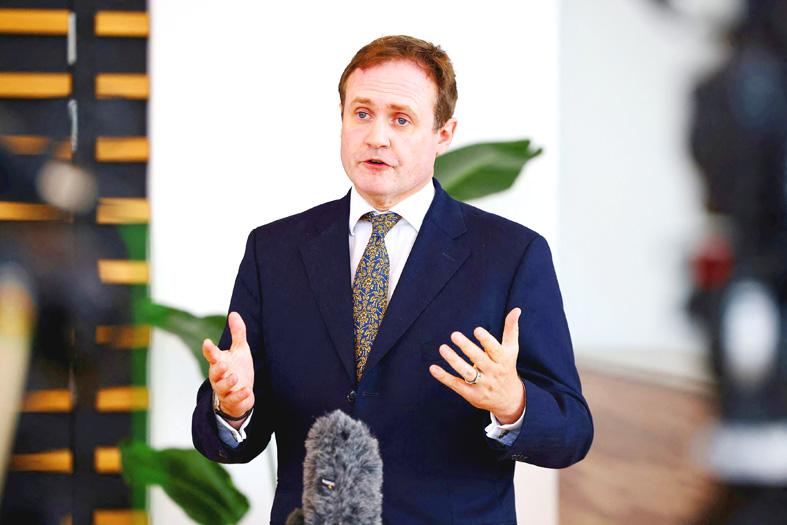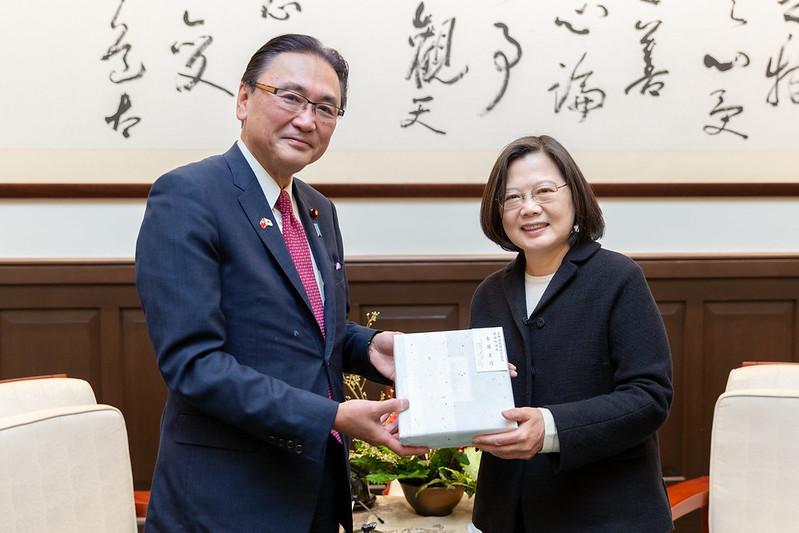Lawmakers from Japan, Canada, Germany and the UK are planning trips to Taiwan in the next few months to show support amid heightened Chinese intimidation following US House of Representatives Speaker Nancy Pelosi’s visit to Taipei earlier this month.
Next to visit from Monday to Wednesday next week is a delegation from Japan’s parliament, Kyodo News reported on Tuesday.
The group is to be led by Japanese Representative Keiji Furuya, chair of the Japan-ROC Diet Members’ Consultative Council and a member of the ruling Liberal Democratic Party, Kyodo News reported, quoting multiple sources.

Photo: Reuters
They are expected to meet with President Tsai Ing-wen (蔡英文) and defense officials to discuss improving defense systems in cooperation with the US, as well as Chinese military drills staged after Pelosi’s visit, it reported.
They are also expected to discuss sending a council delegation to attend Double Ten National Day celebrations on Oct. 10 and holding trilateral strategic dialogue with US lawmakers, it said.
Furuya previoulsy visited Taiwan in September 2020 to attend the funeral of former president Lee Teng-hui (李登輝).

Photo courtesy of Office of the President.
The Ministry of Foreign Affairs on Tuesday welcomed the announced visit by the council, which sent a delegation annually until the COVID-19 pandemic began in 2020.
Emphasizing the trip as a return to normalcy as border controls are eased, ministry spokeswoman Joanne Ou (歐江安) told the Central News Agency that arrangements are still being made and details would be made public when ready.
Canadian lawmakers are planning a trip to Taiwan in October for what the delegation’s leader called a “necessary” visit.
The group of eight from the Canadian House of Commons Standing Committee on International Trade is to be led by the group’s chair, Judy Sgro of the Liberal Party, Canadian Broadcasting Corp (CBC) reported on Tuesday.
“The trade committee is very anxious to go and to visit Taiwan and see what opportunities there are for deeper trade relations between our two countries,” CBC quoted Sgro as saying.
Sgro, who chairs the Canada-Taiwan Parliamentary Friendship Group, said that planning for the trip began last spring, but is still contingent on COVID-19 protocols.
“We need to protect other countries that have fought for their freedom and for their democracy,” she said. “So, yes, you know, I’m trying to be diplomatic in my comments, but clearly I’m proud that Canada is standing up to China as well, and I think that pushback is very important.”
The group, which had 89 members from both parliamentary chambers as of last year, previously sent a delegation to Taiwan in 2014.
Two separate delegations from Germany’s Bundestag are expected in October.
Six lawmakers of the Germany-Taiwan Parliamentary Friendship Group are planning a visit during the first week of October, German lawmaker Holger Becker told visiting Taiwanese officials on Monday last week.
At the end of October, the Bundestag’s Committee on Human Rights is to send a delegation of eight lawmakers from six political parties to Taiwan as part of a larger Asia tour, German news agency DPA reported.
The committee had reportedly planned a visit in 2020 that was canceled due to the pandemic.
Earlier this month, the Guardian reported that the UK House of Commons Foreign Affairs Committee is to send a delegation in November or early December.
If he is still chair of the committee after elections next month, British Member of Parliament Tom Tugendhat is expected to lead the trip, which was postponed from early this year after a member tested positive for COVID-19, it said.
Additional reporting by Lu Yi-hsuan

FALSE DOCUMENTS? Actor William Liao said he was ‘voluntarily cooperating’ with police after a suspect was accused of helping to produce false medical certificates Police yesterday questioned at least six entertainers amid allegations of evasion of compulsory military service, with Lee Chuan (李銓), a member of boy band Choc7 (超克7), and actor Daniel Chen (陳大天) among those summoned. The New Taipei City District Prosecutors’ Office in January launched an investigation into a group that was allegedly helping men dodge compulsory military service using falsified medical documents. Actor Darren Wang (王大陸) has been accused of being one of the group’s clients. As the investigation expanded, investigators at New Taipei City’s Yonghe Precinct said that other entertainers commissioned the group to obtain false documents. The main suspect, a man surnamed

DEMOGRAPHICS: Robotics is the most promising answer to looming labor woes, the long-term care system and national contingency response, an official said Taiwan is to launch a five-year plan to boost the robotics industry in a bid to address labor shortages stemming from a declining and aging population, the Executive Yuan said yesterday. The government approved the initiative, dubbed the Smart Robotics Industry Promotion Plan, via executive order, senior officials told a post-Cabinet meeting news conference in Taipei. Taiwan’s population decline would strain the economy and the nation’s ability to care for vulnerable and elderly people, said Peter Hong (洪樂文), who heads the National Science and Technology Council’s (NSTC) Department of Engineering and Technologies. Projections show that the proportion of Taiwanese 65 or older would

The government is considering polices to increase rental subsidies for people living in social housing who get married and have children, Premier Cho Jung-tai (卓榮泰) said yesterday. During an interview with the Plain Law Movement (法律白話文) podcast, Cho said that housing prices cannot be brought down overnight without affecting banks and mortgages. Therefore, the government is focusing on providing more aid for young people by taking 3 to 5 percent of urban renewal projects and zone expropriations and using that land for social housing, he said. Single people living in social housing who get married and become parents could obtain 50 percent more

Democracies must remain united in the face of a shifting geopolitical landscape, former president Tsai Ing-wen (蔡英文) told the Copenhagen Democracy Summit on Tuesday, while emphasizing the importance of Taiwan’s security to the world. “Taiwan’s security is essential to regional stability and to defending democratic values amid mounting authoritarianism,” Tsai said at the annual forum in the Danish capital. Noting a “new geopolitical landscape” in which global trade and security face “uncertainty and unpredictability,” Tsai said that democracies must remain united and be more committed to building up resilience together in the face of challenges. Resilience “allows us to absorb shocks, adapt under